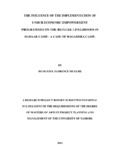| dc.description.abstract | The aim of this research was to assess the influence of the implementation of UNHCR
economic empowerment programmes on the refugee livelihoods in dadaab camp. The
research was guided by four objectives. To establish the role of UNHCR provision of
refugee livelihoods, To assess the impact of vocational training on the livelihoods of
refugees, To establish whether refugees’ training on various skills has influence on
their livelihoods and to establish ways in which these programmes can be further
enhanced for a greater impact. The research was grounded on the theories of
modernization and rational choice theory. The research applied the survey and the
cross sectional research designs. Both primary and secondary data collection methods
were applied among them questionnaires, interviews, direct observations, and library
research. The study found out that humanitarian aid agencies with the support of
UNHCR are working to economically empower the refugees in order to reduce their
dependency on aid. This was upon the realization that the refugees need a source of
livelihood other than depending on humanitarian assistance which is hardly enough
because more often there are new crises elsewhere. This capacity building aims at
enabling refugees to attain self reliance, reducing dependency on Humanitarian aid,
providing refugees with alternative source of livelihoods and equipping the refugees
with skills such that upon repatriation or resettlement, they are able to rebuild their
lives in their new settlements. The humanitarian organizations which implement
livelihoods after receiving funds from UNHCR and other donors include LWF, NRC,
IRC, WVK and DRC.LWF provides soft loans and micro finance facilities to youths
to establish businesses and the vulnerable women; The refugees are receiving skills in
teaching, computer skills, carpentry, leather work, business management, tailoring,
and welding and leadership skills from YEP centers run by DRC which also provides
them with start-up capital to establish businesses. They are also being provided with
secondary and higher education by WTK with others earning scholarships to study in
Canada and other Kenyan Universities and colleges. Other agencies like WVK which
are providing individuals with soft loans and startup capital to start businesses. There
are also microfinance services for the refugees. The youth are being given various
opportunities to exploit their talents in music and sports. These programs have
achieved results because several refugees now have a source of livelihood. Some run
businesses in the market, others work in the agencies where they earn some income
while those are resettled in the third world countries are doing well financially since
they are able to send money to their families back in the camps. The study
recommended that UNHCR and its implementing partners inject more funds into
refugee livelihoods to ensure that the programmes reach out to more refugees; it is
also recommended that the humanitarian agencies assist the refugees to look for
external markets of their products so that they can be able to earn some income. The
study also recommended that agencies employ staffs who are well trained in the
implementation of livelihood projects to ensure that careful implementation and
monitoring of the projects by qualified staff ensures maximum impact. | en_US |

